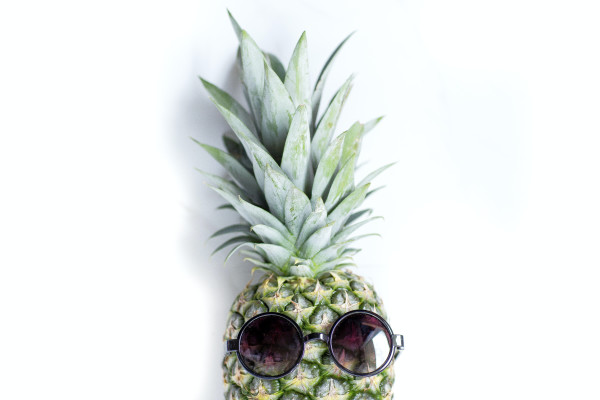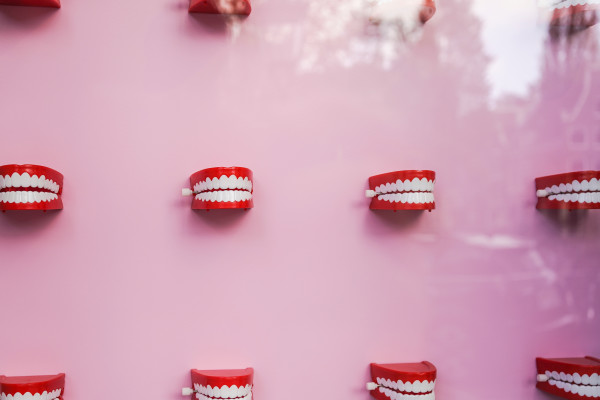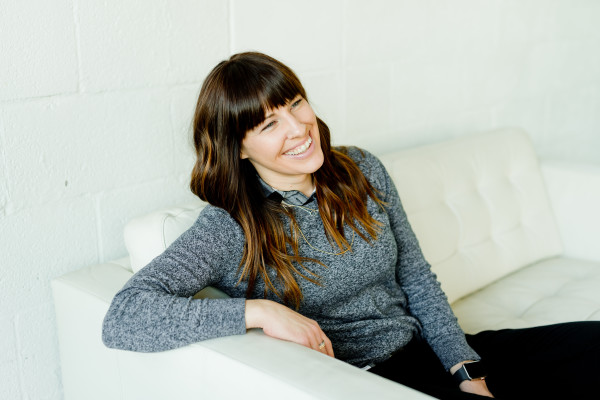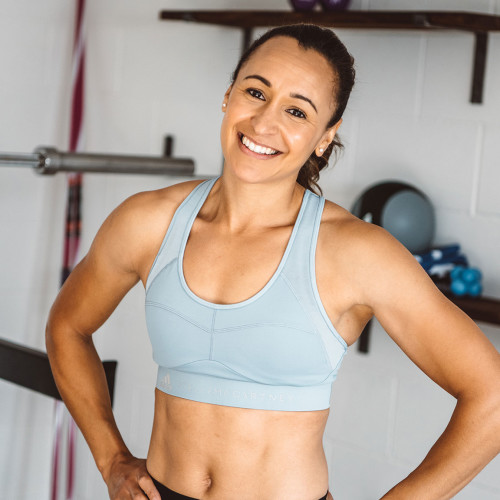Can food act as menstrual cycle medicine?
2 years ago
Cycle syncing2 years ago
Cycle syncing
We know that our diet has a big impact on our hormonal health, but does food have the power to improve our overall menstrual cycle experience? We tuck into the science with Jennis Physiologist, Dr Emma Ross.
From the caffeine buzz to our choice of pre-workout fuel, there’s no doubt that your food choices can affect your mood, energy levels and hormonal balance. But, is it possible to ease symptoms like hormonal headaches, heavy periods and bloating by reaching for different foods at different points in our menstrual cycles...?
According to Jennis Physiologist, Dr Emma Ross, the answer is a resounding ‘yes’. Take your period. “If this is a painful time for you, you might focus your diet on anti-inflammatory foods to combat the effect of inflammatory prostaglandins (the chemicals which trigger period cramps), while iron-rich foods can help to offset the iron being lost in your bleed and the low energy levels that can occur as a result.”
Before we go into detail of what to eat for specific symptoms, there’s one thing Dr Emma wants to make clear. “Our philosophy at Jennis isn’t to overcomplicate things and we certainly don’t want women feeling they have to make massive changes to their diet across each of the four phases. But, there’s definite power in being conscious of what we’re eating at certain points in our cycles and the foods that can help our symptoms or training.”
“During your follicular phase, right after your period, oestrogen is on the up and so are your energy, motivation and muscle recovery levels,” says Emma. “As a result, this is a great time to up your strength and HIIT training sessions (we’ll programme this in for you if you’re on the Jennis CycleMapping plan).”
To supplement your hard work, eat more lean protein like fish, chicken and tofu, as well as healthy helpings of veg. The combination will help to regulate both your blood sugar and cortisol levels, which will also help lean muscle growth.
It’s a little-known fact, but women are less efficient at fuelling with carbs that are rich in fructose
Carbs get a bit of a bashing in the media these days, with the suggestion being that cutting carbs leads to weight loss. “I really don’t like this message, as carbs are incredibly important for fuelling and are the main fuel for strength and high intensity work,” says Emma.
To really get the most out of your training, make sure you fuel and refuel with ‘quality’ carbs, such as veg, pulses and grains, and try to avoid carbs that are high in fructose, such as juices, apples and grapes. “It’s a little-known fact,” reveals Emma, “but women are less efficient at fuelling with carbs that are rich in this naturally occurring sugar.”
During your period, your body produces higher levels of prostaglandins (pronounced: pross-tah-gland-dins). This is a group of hormone-like fats which cause the smooth muscle of the uterus to contract so that you shed your uterine lining. While prostaglandins are necessary for a healthy period, if you produce too many, it can lead to painful cramps, gastro-intestinal (GI) / tummy upset, headaches and fatigue.
It stands to reason that if you reduce the prostaglandins, you can reduce the severity of cramps and other symptoms - and that's where the food you eat can help. “Research has shown that eating foods rich in magnesium and zinc like lentils, chickpeas and nuts, in the lead up to and during your period can help to reduce the amount of prostaglandins you produce,” says Emma. “Similarly, studies have shown that taking supplements of fish oil, rich in omega-3s, could reduce period pain by up to 30%.”
Though your period might be the time that you reach for the Dairy Milk, women often find that very sugary foods (alongside caffeine and alcohol) are actually common triggers for their pain – likely because of their inflammatory effects. "If you can resist the urge, it’s worth avoiding sugary snacks and excessive caffeine at this time," advises Emma.
Studies have shown that taking supplements of fish oil, rich in omega-3s, could reduce period pain by up to 30%
Finally, while we’re never about cutting out specific food groups, there’s increasing anecdotal evidence that cutting down on cow’s dairy could help to ease the pain too. “Menstrual health practitioners have found that for some people, it can have a significant effect on their cramps,” says Emma. “The reason for this is that some of us (but not everyone) are intolerant to a specific protein called A1 casein in cow's diary, which causes an inflammatory response, which in turn can lead to period pain, PMS and heavy periods.”
30 days of dairy elimination should give you an idea of whether it can improve your period symptoms. Just don’t forget to compensate your calcium with other sources like non cow-dairy cheese and green leafy veg.
“If you experience low energy levels during the heaviest part of your period, you could benefit from eating high-iron foods like spinach, legumes, red meat and pumpkin seeds, which can correct any iron deficiency caused by a heavy period,” says Emma. “Another good tip is to go a bit lower on caffeine if you’re experiencing a particular heavy period, as this can interfere with iron absorption.”
Finally, a lesser-known wonder supplement that's proven in numerous studies to ease heavy periods and period pain is turmeric. Not just a tasty yellow spice in our curries, it contains an active anti-inflammatory ingredient called curcumin, which eases a number of cycle symptoms, including the pain of heavy periods and even endometriosis. Try it as a supplement if you’re not getting enough in your diet, and take it after your meal for better absorption, advises Emma.
With oestrogen levels at their lowest just before and during your period, this is the time when you’re most likely to experience menstrual or hormonal headaches. While your diet won’t tackle the hormonal cause of them, a little forward planning can help.
“One of the best ways to stem headaches is to stay well-hydrated and keep your blood sugar as stable as possible by planning frequent, balanced meals and snacks around this time," says Emma. By eating small, healthy snacks more often, it can help you offset potential blood sugar spikes and crashes that can worsen headaches.
Research shows that changes in progesterone and oestrogen levels during your cycle (and particularly your Luteal or Pre-menstrual phases) can cause your body to retain more water and salt. This makes the body’s cells become full of water, which in turn leads to that swollen, uncomfortable feeling.
Emma suggests three key things to ease the bloat: “First of all, chew your food more. If you’re eating in a rush, you gulp down air at the same time, and that can make your hormonally-induced bloat even worse.”
“Go low on salty and highly processed foods – studies have shown that a high sodium diet can cause our bodies to retain up to 1.5L of water.
“Lastly, even though it feels counter-intuitive, staying well-hydrated gives you the best chance of beating the bloat. If you restrict the amount of water you’re giving your body, it will try extra hard to hold onto what’s already there, which causes fluid retention.”
B-vitamins are brilliant for energy production, so stock up on foods like wholegrains, nuts, seeds, eggs and fish to help fight the slump.
Some women report low energy levels around their period and just after ovulation, likely because our oestrogen levels are lowest at this time. If you’re feeling a dip, there are 3 simple strategies you should consider.
First, make sure you start the day with a protein packed breakfast (like eggs on rye) and try including more protein in your meals across the day.
Choose carbs with a lower glycemic index (such as oats, beans and lentils), as these are digested more slowly, keeping your blood sugar stable and giving you a steady supply of energy throughout the day.
Finally, a recent review found that B-vitamins – integral for brain function – are brilliant for energy production too, so stock up on foods like wholegrains, nuts, seeds, eggs and fish to help fight the slump.
When it comes to nutritional advice across your cycle, you’ll notice that we take a ‘food first’ approach, with the ideal being that you get all the key nutrients and supplements you need from what you put on our plate. The reason for this is that your body absorbs nutrients better through food and it means your diet stays balanced. However, we’re also realists. When life is busy and you’re juggling a million things, you sometimes need a helping hand to get our recommended daily allowance (RDA) of specific micronutrients.
With this in mind, if we were going to recommend the absolute best supplements to take across your ‘whole cycle’ for period pain reduction and general cycle health, “there are three things that come out top in studies time and time again: Omega-3, Zinc and Magnesium,” says Emma.
 Cycle syncing
Cycle syncing Perimenopause
Perimenopause Perimenopause
Perimenopause Perimenopause
PerimenopauseSign up to learn everything you need to know about CycleMapping, plus how you can live better and feel better through optimising your fitness to you.
This website uses cookies to ensure you get the best experience on our website. Learn more

Sign up for the very latest news on women's fitness, health and hormones, plus be the first to receive exclusive offers and extras